Selected Verses From The Harivamsha Purana
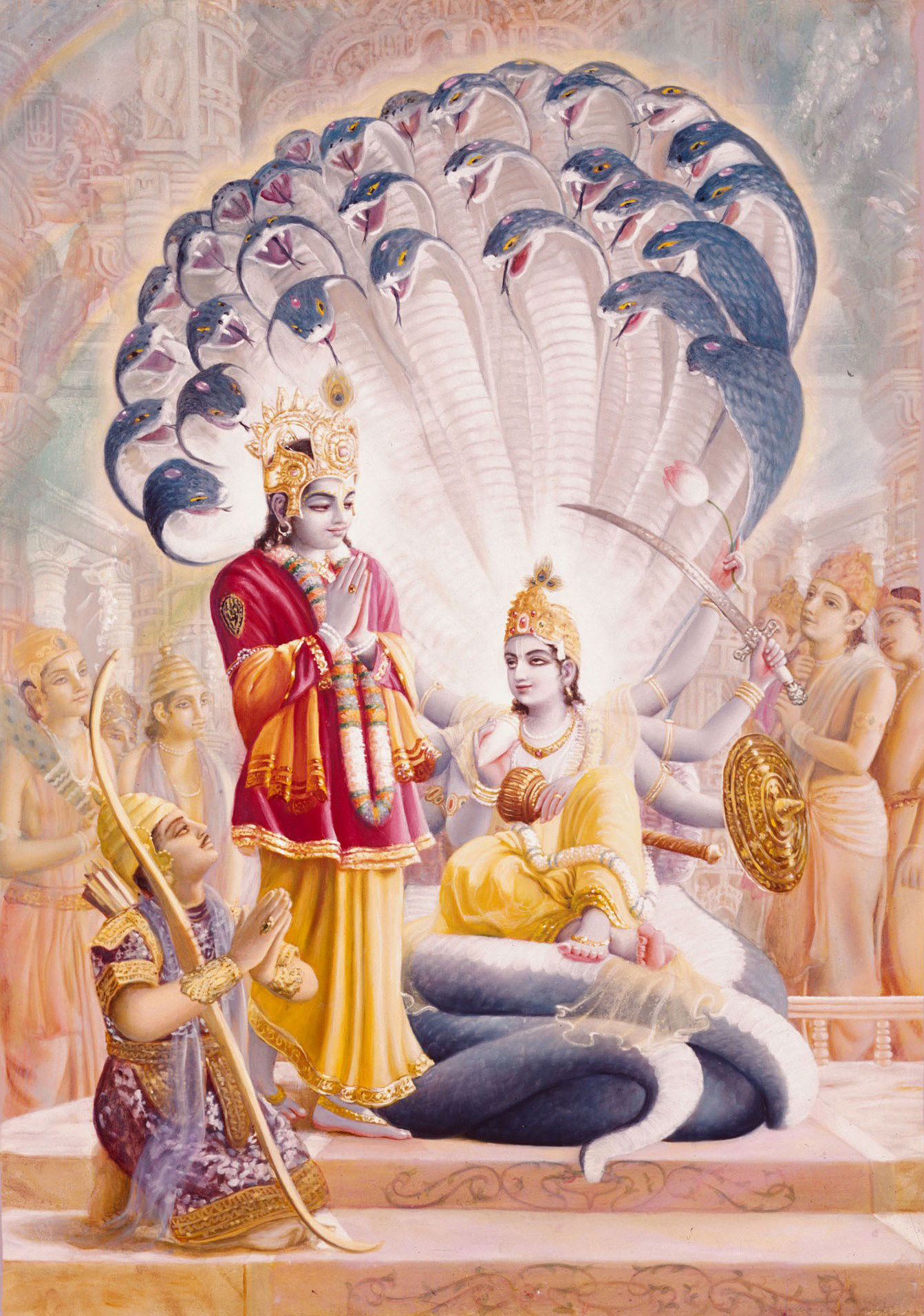

This universe, permeated by Isvara, emanated from Pradhāna Purusha who is the unmanifest cause, eternal and identical with the existent and nonexistent.
Know him, O monarch, as Brahmā of incomparable energy, the Creator of all beings, and ever devoted to Narayana.
– Harivamsa Parva 1.21 – 22
The waters are called as Nārā as they are the offspring of Nara. The Lord first slept on that Water (Nara), and is therefore called Nārāyana.
The egg, lying in the waters, assumed golden hue—from that was born Brahmā, and he is therefore called Self-Born.
Having lived in that Golden Egg for many years, the divine Hiranyagarbha divided the Egg into Two – The Heaven and The Earth
The Lord created Akāsa (Sky) or Space between the two portions and in the waters he created the Floating Earth and the Ten Quarters.
Thereupon desirous of creating, He created time, mind, speech, passion, anger and desire.
– Harivamsa Purana 1.28 – 32
The powerful prime king Prithu, the son of Vena, deserves also the adoration of the great kings who desire kingdoms. The first king of the heroes, Prithu, is also worthy of the adoration of the valiant warriors who wish for victory in battle!
– Harivamsa Purana 6.48 – 50
Having worshiped that Lord of All Deities, Hari, for eighteen years, by the grace of that Divine Person (Purusha), I did not suffer any pain.
O sinless one, I did not feel then hunger and thirst nor the time. Afterwards I learnt about the time from my disciple.
– Harivamsa Purana 19.21 – 22
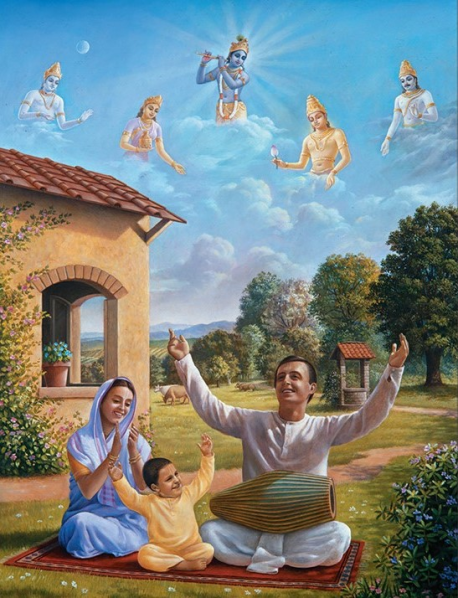
The non-violent King Namuchi made this promise “I shall not attack anybody”.
Lord Hari, afterwards, ended King Namuchi’s life with a foam.
A man should destroy his enemy either with poison, fire or water, whether the enemy be drunk, unconscious or careless.
In fear of future enmity, wise men do not spare their enemies, at all.
Remembering this example, they bring about the Complete Extermination of their enemies, without mercy.
An enemy laughs, talks, takes food from the same plate, sits on the same seat, but he is always an Enemy.
Even contracting a relationship with an enemy, one should still not trust that enemy. The King, though himself a son-in-law, destroyed Puloma, his enemy.
As a deer does not approach a hunter, so a wise man should not go near him who speaks sweet words from outside but keeps hatred in the heart.
It is not proper to live near an enemy who has prospered. He brings about our destruction, as a river flood destroys and uproots a tree.
Even if obtaining progress from an enemy, one should not trust him. Securing progress from an enemy, one meets with destruction like an earth-worm.
– Harivamsa Purana 20.128 – 136
On account of the hard austerities performed by them in seven births, of the Yog Practices carried on by them and of their Good Karma they listened to the recitation, of the Vedic Hymns in their first birth in the house of their preceptor. In consequence thereof, their inclination remained pure though they lived in the Material World.
All these Brahmachārins had the knowledge of Brahman; and having been engaged in meditation, they lived there.
– Harivamsa Purana 21.38 – 40
Lord Hari, having made various classifications of Yugas and displaying his prowess before all men, He created Kshana, Lava, Kāshtha, Kalā, the present, past and future, Divisions of Time like – Muhurta, Tithi, Maas, Paksha, Samvatsar and Ritu – and also the three divisions of the length of life. He made the characteristics and the Beauty of People based on the Color of Varnas (Skin Complexion), he made the Three Lokas, the Three Vedas, the Three Fires, Three Kālas, the Three Fold Actions, the Three Upāyās, and the threefold Gunas.
By his endless actions these three worlds had been created by Him before. He is the creator of all the Elements and Gunas and identical with them all. By introducing birth and death amongst mankind he makes the souls move about in the universe through rebirth. He sports every-where in different shapes. He is the Lord of the Universe. He is the Refuge of the Devotees and he always punishes the wicked. He is the origin of the varnasrama-dharma and the protector of the Four Hotras.
He is the master of the four-fold knowledge and the preserver of the four Asramas. He is indentical with the various directions, and with the sky, with the air, fire and water. He is identical with the sun, the moon and the rays. He is the Lord of Yogins and He only brings about an end to darkness. He is identical with the most excellent lustre and tapas of which we hear.
The sages designate him as the thread that connects the beads of our souls; and the whole universe is the necklace of His Form.
The Vedas and all the sacred texts exist in Nārāyana. He is the greatest virtue and is most excellent. Truth exists in Nārayanā and Tapas exists in Him.
Salvation exists in Nārāyana and Nārāyana is the most excellent refuge.
He is Aditya, and he is the slayer of demons. At the time of the pralaya, he destroys all. He is death unto death, who destroys all. He is the Lord of the Manus, and He is more sacred than Ganga.
– Harivamsa Purana 40.34 – 44
The seat of cough is the heart, and the seat of bile is the navel. The heart, which is in the body, is known as the seat of the mind.
– Harivamsa Purana 40.51
The Four Vedas were his feet, the sacrificial altar was his tusk, the sacrifices were his teeth, the pyre was his mouth, the fire was his tongue, and the Darbha Grass were the hairs of his body. The great ascetic Brahmā was his head, the days and nights were the blinking of that eldest Purusha, the various divisions of the Vedas were the ornaments of his ears, the progenitors were his nose, the Chanting of the Sama Veda was his great voice.
He, that Purusha, was identical with virtue and truth. Penance was his nostril; dreadful beasts were his nails and he had long arms. The air was his soul, the mantra was his hip, the sanctified Soma juice was his blood, the sacrificial altars were his shoulders. Havi was his smell, Havy and Kavya were his energies, Nāgvangsha was his body. He was effulgent and sanctified by various forms of initiation.
Dakshinā or gift was his heart. He was an ascetic and great and the recitation of the Vedic hymns was the ornament of his lips. The great heroes, who fight for virtue, were his ornaments. The various metres were his motion. The sacred Upanishad was his seat. The help of Sri is his support, and he is tall like the summit of the Mount Meru. This thousand headed Prime Deity, that Purusha, re-established the Earth.
– Harivamsa Purana 41.29 – 37
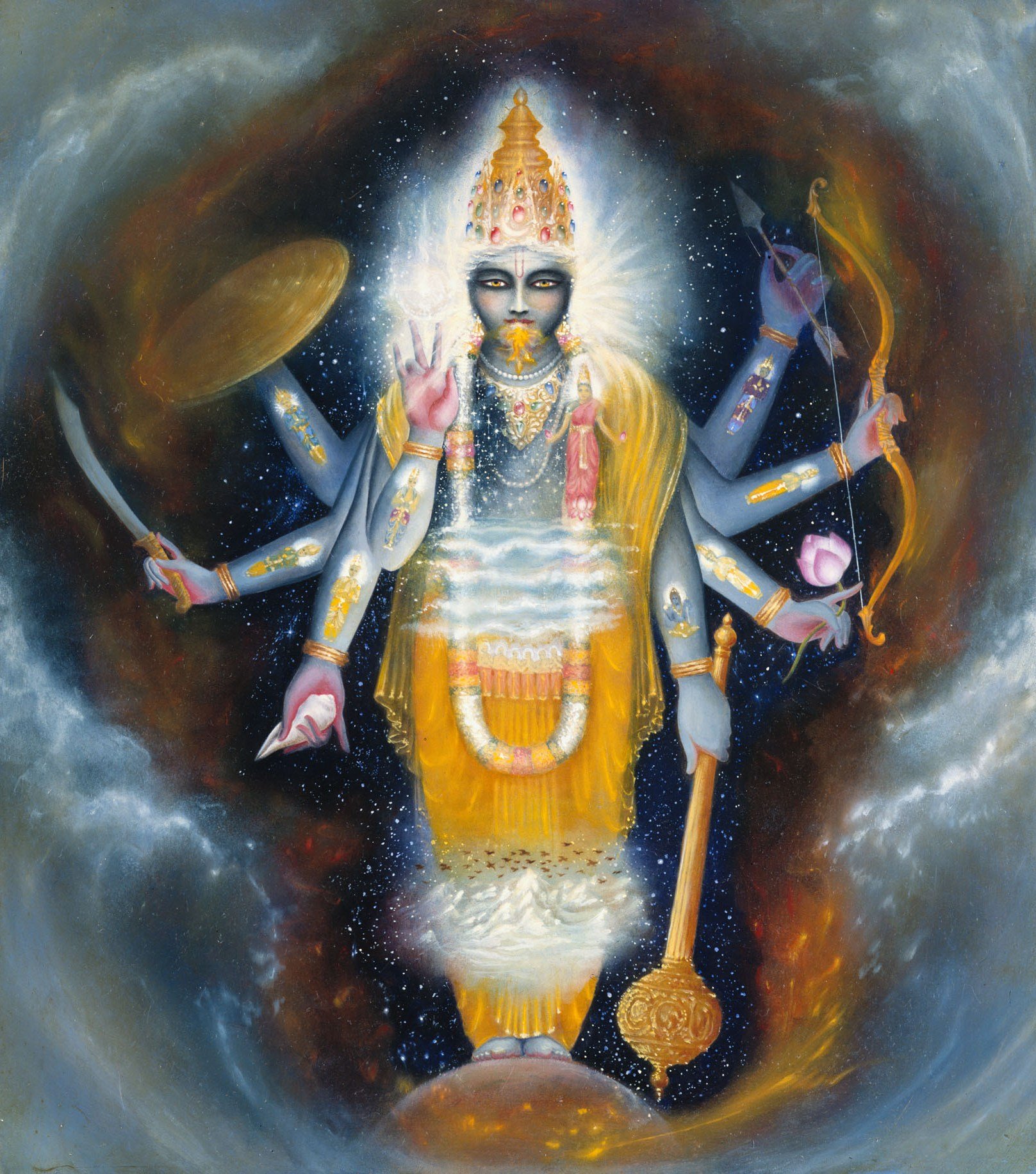
When the Vamana Avatar placed his foot-step on the Earth, the sun and the moon reached his chest,
And when the Vamana placed his foot-step in the sky, the sun and moon were near his stomach.
And when he placed his foot-step on the heavens, the sun and moon were near the feet of the highly powerful Vishnu.
This has been narrated by the twice-born ones.
– Harivamsa Purana 41.100 – 101
Listen, O king, duly to the honor of Vishnu as Viswam (Universal).
To that of Hari in the Satya Yuga, to that of Vaikuntha amongst the gods, to that of Krishna amongst men, to that of the Supreme Lord, and to the motive of his various actions past and future.
Although invisible, the Lord assumed forms in various periods – Narāyana is the cause of all creations and is eternal.
This Narayana assumed the form of Hari in the Krita Yuga – Brahmā, Indra, Chandra, Dharma, Sukra, Brihaspati and all such, are all the forms of Nārāyana only.
– Harivamsa Purana 42.1 – 4
Stationed in the Pure Sky, that Vishnu, that Supreme of the Gods, promised to the celestials, saying,
“O ye Maruts, may you fare well, do not fear. Be at ease. I have defeated the Danavas. Do ye take back the three worlds.”
Thus welcomed by the words of the truthful Hari, the gods attained to that supreme delight, which they enjoyed when they obtained Soma out of the ocean.
Thereupon the darkness was removed and the cranes emitted cries. Auspicious winds blew and the ten directions were cleared up.
The shining stars began to circle around the moon, and other luminous stars began to move round the sun.
The planets did not oppose one another and all the rivers grew delightful. Etherial and celestial roads appeared beautiful.
The rivers began to flow quietly and the oceans did not suffer any agitation. The internal organs of men worked well.
The great saints were shorn of grief and began to chant the Vedic hymns.
Hearing the promise of the Lord that he would slay all the enemies in battle the fire began to eat sweet and nourishing oblations.
Sacrifices were duly undertaken and the minds of men were delighted.
– Harivamsa Purana 42.31 – 36
The Lord Hari Vishnu rode that huge-bodied younger brother of Aruna, the King of Birds, the suparna Garuda, who was the best of the twice born, who ate serpents, who was the son of Kashyapa, who was superior even to the wind in speed, who used to agitate the sky, who had big snakes hanging from his sharp teeth,
Who was huge like the Mount Mandara, who displayed his prowess hundreds of times in the encounter between the gods and demons, whose body was marked with thunder-bolt by the king of gods, who had tufts of down, who was adorned with shinning ear-rings, who had a raiment of variegated feathers, who was huge like a mountain consisting of metals and who had on his big chest, necklace of dragons of moon-like lustre shinning with brilliant jems.
He remained easily in the sky with his two beautifully colored wings like two clouds with rainbow at the time of the universal dissolution. He was dreadful in the enemy’s camp adorned with red, dark and yellow flags. The gods followed that leader Garuda in battle. The great ascetics sang the glories of Gadādhara with excellent hymns.
– Harivamsa Purana 44.38 – 48
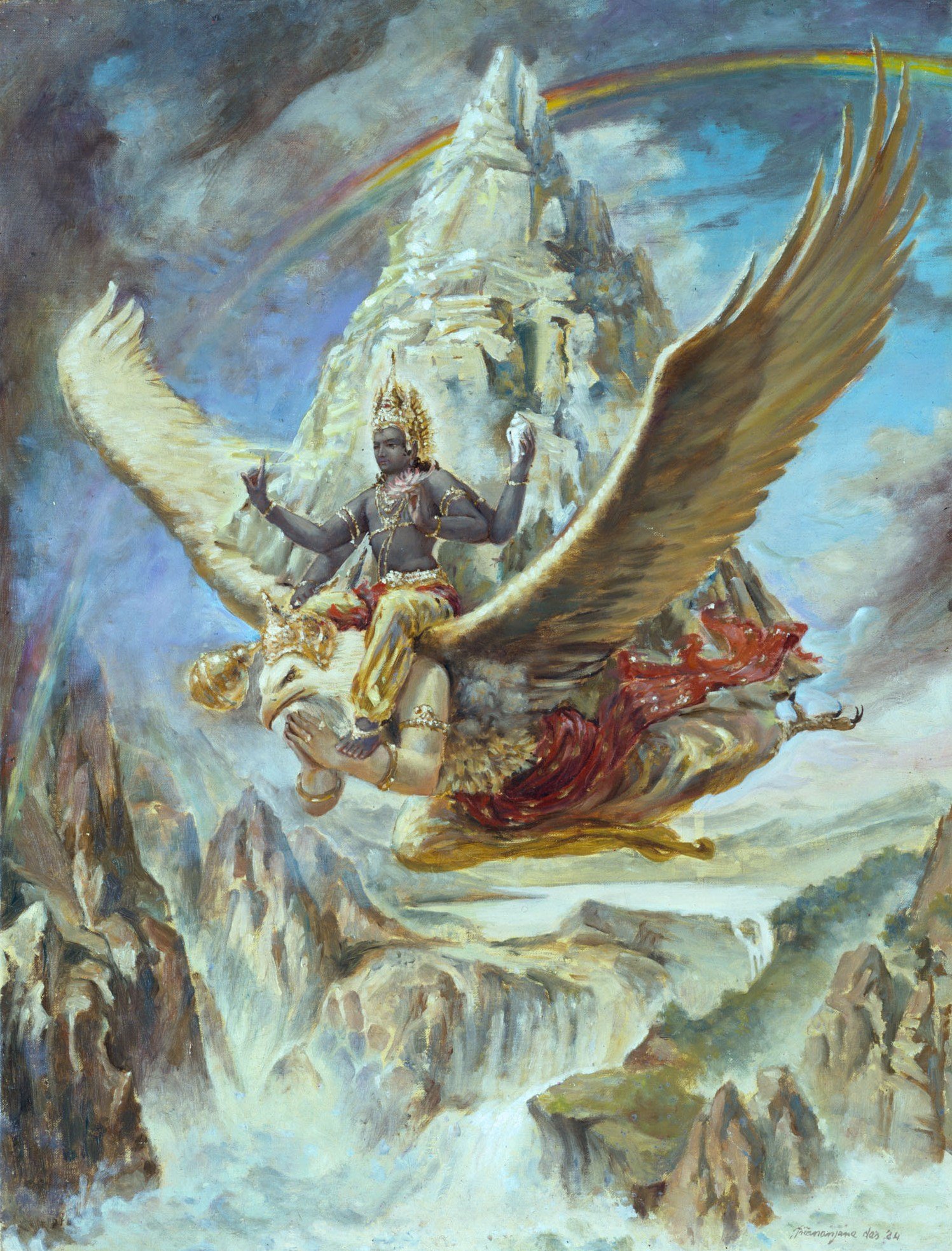
This Lord Narayana is identical with the Three Worlds, and the Three Worlds too are pervaded by Him only.
He is same as the Gods in Heaven and they too are same as Him.
Many persons, desirous of going to the other end of the world, cannot see his end. This Madhava is the end-all and be-all.
– Harivamsa Purana 49.9 – 10
Having entered the Narayanashrama, which was so named after Him, the Narayana, the Lord left off all his weapons.
He saw in that Narayanashrama his own Abode, resembling an ocean, filled with the gods and the immortal Rishis, covered with Samvartaka and other clouds, enshroued with the darkness of the starry region and was beyond the reach of the gods and demons, there the winds do not blow and the sun and the moon do not shine. It was enveloped with the effulgence of the body of the padmanabha.
Entering there, carrying luscious hair and being many-headed, The Lord began to make arrangements for lying down. Sleep itself, having dark eyes, appeared before that high-sould deity.
On account of his acquiring a mastery over his senses, Hari, the foremost of those observant of vows, laid himself on a celestial bed cool like the water of the Ocean. The Rishis and the Gods began to worship the great Omnipotent Vishnu, thus gone to sleep for the creation of the universe. When He was asleep there sprang from his navel a lotus as effulgent like the sun, the Seat of Patriarch Brahma.
That lotus had thousand petals, a beautiful hue, was tender and well-adorned.
Raising up his hand which is the thread of the pristine desire the great Muni Brahmā whirls the wheel of the changes of all the worlds brought about by time.
– Harivamsa Purana 50.3 – 12
Who is awake in this body? Who is asleep? Who, being capable, does not perform a work? Who enjoys the various objects of pleasure? Who is effulgent? And who is subtler than the subtle itself?
– Harivamsa Purana 50.17
Saying ‘So be it’, The Lord, having the skin of a blue cloud and voice like music, went away with the gods like a mountain covered with clouds.
At that time, Hari, being a dark person like a blue cloud, put on shinning crown crested with jems and pearls like a cloud with the moon. On his spacious chest, there was the mystic mark of Srivatsa.
Wearing two pieces of yellow cloth, that eternal Hari, the preceptor of the world, looked like a mountain covered with evening clouds.
– Harivamsa Purana 52.1 – 4
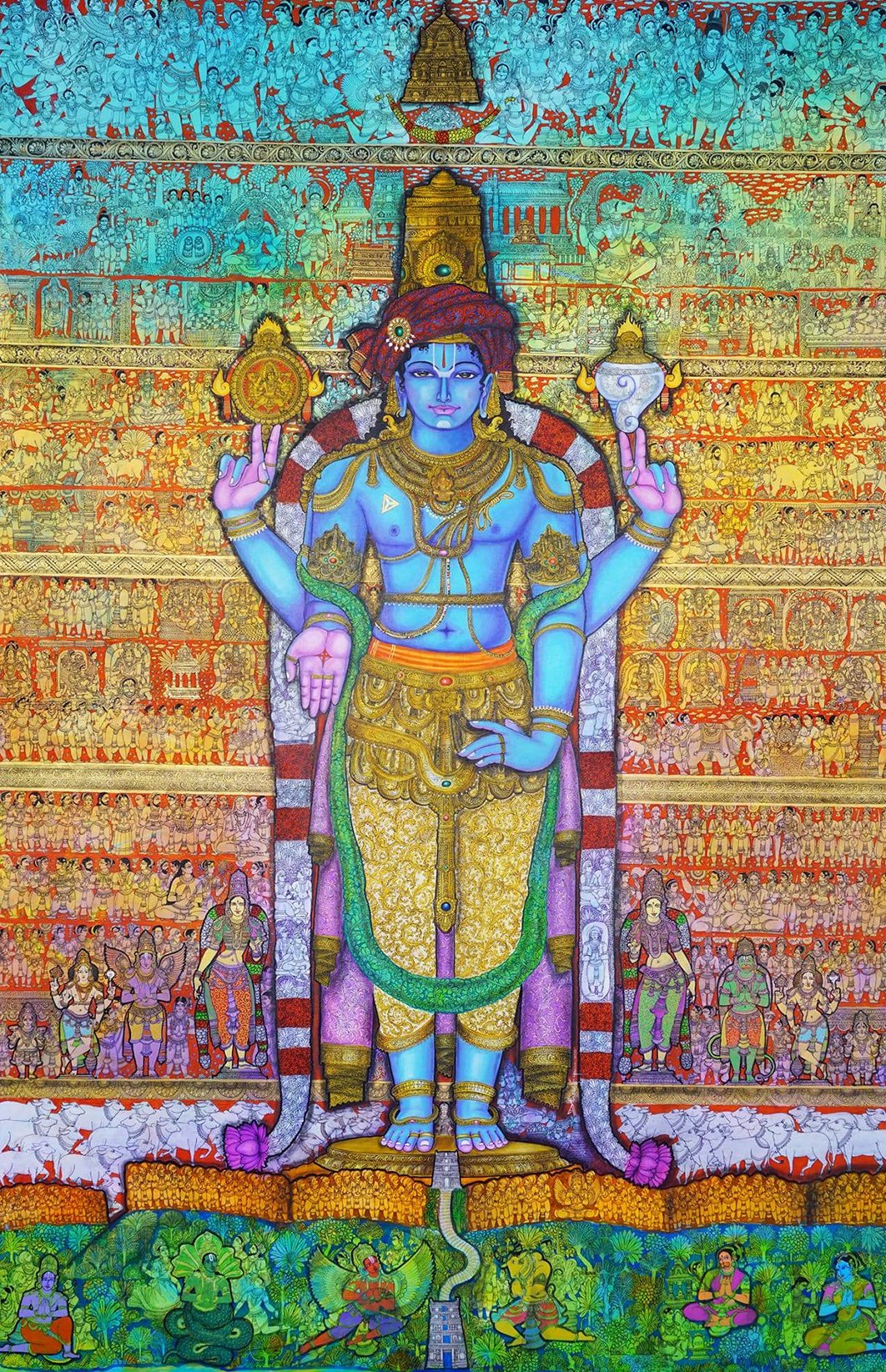
Fire is the cause of refined gold, the Sun is the cause of the stars, and so Nārāyana is the cause of Me, and He is my support.
I am alone holding this universe consisting of mobile and immobile creations. And that Wielder of Mace is supporting all these held by me!
– Harivamsa Purana 52.44 – 45
Having saluted the goddess Narayani, the mistress of the three worlds, sung the ancient Rishis
O goddess, thou art the salvation, intelligence, glory, bashfulness, learning, advancement and inclination of all worlds.
Thou art identical with twilight, night, ray, sleep and the kaal-ratri (night of death).
Thou art designated as the worshipful Katyayani, Koushiki, who takes vow of celibacy, and the Mother of Kartikeya.
Thou art highly powerful and practise hard austerities!
O goddess, thou art Jaya, Vijaya, satisfaction, nourishment, forgiveness and mercy.
Thou art clad in a blue silken raiment and the Eldest Cousin of Yama.
Thou art have various forms, with large eyes – The Protector of Devotees!
O great one, living on the summits of fearful mountains, in rivers, caves, and forest, thou traverse the worlds in a chariot with peacock flags.
Surrounded by hens, goats, lambs, lions and tigers, and worshipped by the ringing of Bells, thou always live in the Mount Vindhya.
– Harivamsa Purana 58.1 – 7
In the auspicious midnight and in Abhijit Muhurta, Devaki gave birth to Vishnu himself, and Yashoda to that daughter.
When Janardana was born, the oceans were agitated, the pillars of the earth were shaken, all fires got extinguished, auspicious winds began to blow, the dust was removed and the luminous bodies manifested themselves.
When the invisible, eternal and powerful Lord Hari of subtle soul, who encompasses the well-being of the world, was Born, at that time the Night was Jayanti, the Nakshatra was Abhijit, and Muhurta was Vijaya.
As soon as he was born he overpowered all the worlds with his beauty. The celestial bugles began to produce sound without being struck and the king of heavens showered flowers from the heavenly region.
The great saints, accompanied by the Gandharvas and Apsaras, chanted the glories of the slayer of Madhu in auspicious hymns.
When Hrishikesha was born the whole universe was in an ecstacy of joy.
– Harivamsa Purana 59.14 – 20
That goddess, having a moon-like face, surrounded by ghosts and goblins, became dreadful to Kansa, roaring like thunder,
Dancing and roaring in that dark night, she rose up in the sky. Drinking most excellent wine and laughing aloud, she said to Kansa, in anger –
“O Kansa, for your own destruction you had tried to dash me against a rock. Therefore at the time of your death, when your enemy will end you, I will tear off your corpse with my hands and drink your blood.”
Giving vent to these dreadful words, the goddess, rose up in the sky; and encircled by her followers, she began to range in the celestial region.
– Harivamsa Purana 59.39 – 45
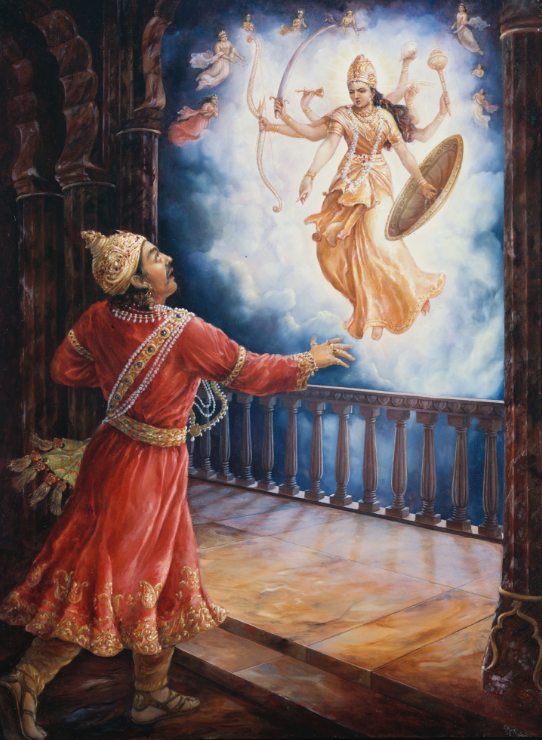
Incarnating himself as Krishna, the Lord Hari, assuming the blue hue of a cloud, grew up there in Gokul in the midst of milk-men, like a cloud in the ocean.
– Harivamsa Purana 61.3
Kansa was completely possessed by Destiny and so he saw the cowherd, Sri Krishna, coming towards him from The Sky.
Thereupon stretching his own parigha-like arms, Krishna drew Kansa by the hair in the arena.
Assailed by Krishna’s hands, Kansa’s golden crown, set with diamonds, fell down on earth from his head.
When Vāsudeva held Kansa by the hair he became motionless and agitated, and acted as if he’s lifeless. He was not capable of seeing even Krishna’s face!
His ears were devoid of his earrings, his necklace was torn off, his arms grew lengthened and his body was shorn of ornaments.
Thus possessed by divine effulgence, Kansa’s face grew bewildered.
Coming down from the pavillion and holding Kansa by the hair, Keshava began to drag him in the arena.
The highly effulgent King of Bhoja being thus dragged by Krishna, thus sporting in the arena, when Kansa breathed his last.
– Harivamsa Purana 85.75 – 84
Having thus defeated Jarāsandha, the wicked King of Magadha, the great Warriors of Vrishni, Krishna and Balrama, began to live happily.
– Harivamsa Purana 92.40
He was seated near that tree, had his Axe on his shoulder, wore coating and matted hair.
He was as white as the flames of fire, effulgent like the sun — The Destroyer of Kshatriyas!
Motionless like the Ocean, he was preserving the three sacred fires, emaciated with the three oblations a day. He was like the very preceptor of Gods.
– Harivamsa Purana 95.21 – 26
Clad in a dark-blue apparel, Balarama’s white complexion appeared like the moon enshrouded by darkness. His Plough, attached to his hands like a hood, and his burning mace fixed to his finger, increased his beauty even more.
– Harivamsa Purana 102.28
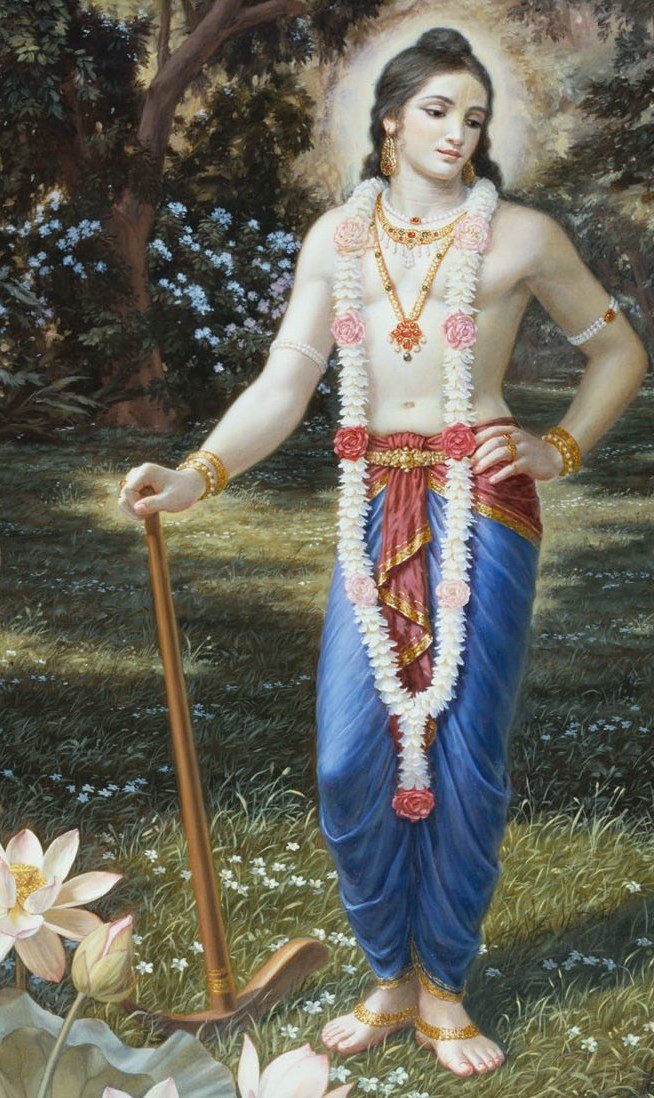
Hearing of Krishna’s Abhisekha from their emissaries, some amongst the pious devotee kings became very happy, but other enemy kings were stricken with fear and sorrow.
– Harivamsa Purana 106.63
Bhishmaka said :- O God of gods, O Nārāyana, O Parāyana, thou hast no origin or destruction. Thou art the eternal Prime Deity, I bow unto thee!
Thou art the self-born Deity, identical with the universe, with padma-nabha (lotus navel), with lucious hair, dost hold a staff and art of dark blue hue. I bow unto thee!
Thou art the Hansa (Swan), the Sudarshan, the Vaikuntha — Unborn and the Great Atman. I bow unto thee!
Thou art Yogin, the existent and non-existent, the Adi-Purusha, the Purushottamah, above three-fold qualities. I bow unto thee!
O Lord, O foremost of celestials, you alone are the Lord of all the worlds and the Lord of those who have acquired a knowledge of the soul.
I am thy votary. Be thou propitiated and confer on me a boon!
– Harivamsa Purana 108.56 – 60
Kalayavana, the white king of Yavanas, was highly powerful and he used to govern the inhabitants of his city according to his royal duties.
– Harivamsa Purana 110.1
Following Vāsudeva, the stupid Yavana King entered into the cave, and he saw a Yogi. And like an insect falling into fire, he kicked that Yogi with his foot for his own destruction.
With the touch of the foot, the royal saint Muchukunda woke up, and was highly enraged for the break of his meditation.
Thereupon recollecting his boon, he looked at the stupid Yavana with angry eyes. As soon as he was eyed, the king of Yavanas was set on fire!
O king, as a lightning consumes a dried tree so the fire, so did Muchukunda’s eyes reduce Kalayavana to Ashes.
– Harivamsa Purana 114.51 – 55
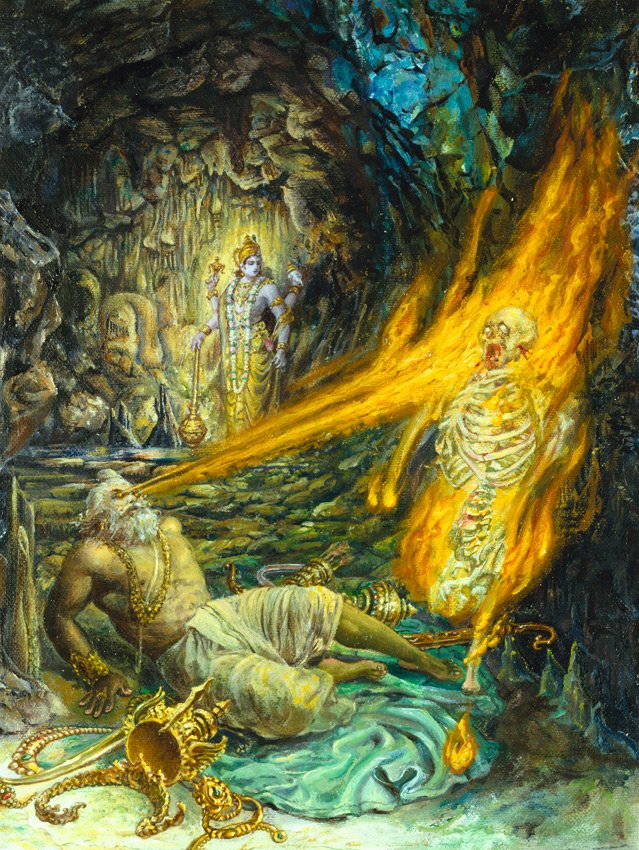
That inconceivable, infinite, ancient Purusha Vishnu, who is beyond the qualities themselves, has thus been described in the Vedas.
– Harivamsa Purana 128.20
She saw there Dwārakā, adorned with Glimmering Palaces as huge as the summits of the mount Kailāsha, like stars stationed in the sky.
– Harivamsa Purana 175.98
O god of gods, O Keshava, thou art always victorious over thy enemies;
Even the performer of hundred yajnas cannot stand before thee.
– Harivamsa Purana 186.12
Krishna is the abode of wonders: there is nothing more wonderful than he.
There is no wonder which has not been performed by Vishnu.
Vishnu is the foremost of the blessed — the origin and bestower of good fortune.
Amongst the Adityas and Daityas he is Achyuta. He is Adityas, Vasas, Rudras, Maruts, the two Ashwinis, the sky, earth, quarters, water and luminous bodies.
Vishnu alone is the creator, preserver and destroyer; He is Truth, Tapas and the grand-father Brahma. Salute Him, O Descendant of Bharata.
This lord of the gods is the whole universe – He is Ananta of the Nagas and Shankara of the Rudras.
This entire universe, moving and non-moving, has emerged from Narayana.
– Harivamsa Purana 187.26 – 29
When the Kali Yuga will appear, men will be laborers, untruthful, fond of alcohol and meat, and look at the wives of their friends.
In the Kali Yuga, the thieves will act like the kings and the kings will act like thieves, and the citizens will enjoy unfixed incomes.
In the last cycle, wealth will be all that matters, and the pious or religious will be hated.
– Harivamsa Purana 190.8 – 10
O king, who can try to know the Great Purusha Narayana whom even the creator Brahma, the originator of the universe, could not know fully.
I have heard what is held as a secret by the creator. Him alone, persons conversant with spiritual knowledge meditate on.
He is the efficient cause of Karma, the prime deity of the gods, and is unseen by all.
He is without beginning and end; He is the eternal truth which the great Rishis strive to know;
He is Jnāna or knowledge of the gods, and is perceived by persons, well read in the Vedas as the Absolute Intelligence.
He is the creator of the objects of senses and creates the elements as Hiranyagarbha.
He is intellect, mind, Kshetrajna, the principle of greatness, Purusha and the Great Soul.
He is identical with time the witness of all and is independent.
He is identical with five vital breaths, the cause of their action, is real and undecaying.
He is the cause of our actions and the ordainer of what we should do and should not.
He should be sought for by us, by every means, should be spoken of and heard of.
He is heaven, moksha, the various changes, the mysterious world and our protector. I will describe the glories of Narāyana unto you.
O king, all that exists in the three worlds, untruth, cause and action, past and future, moving, non-moving and eternal has emanated from the Padmanabha, the Great Purusha!
– Harivamsa Purana 194.15 – 25
Persons, having the knowledge of Nārayana, know him as separate from the unmanifest.
He comprehends all, courses everywhere, has his head everywhere, sees all, has his face towards all, hears all and extends over the space.
He is the cause and action, exists as manifest and unmanifest and is not seen by any body when he moves about.
Although he is beyond the reach of thought and without any form, yet he, assuming a form and manifesting himself, he pervades everything.
He is identical with past, present and future. He is Parameshthin, Prajāpati and the Lord of the Worlds. This name of His has been truly sung!
– Harivamsa Purana 203.3 – 10
The Earth floated over that vast expanse of water like a boat.
On account of the heaviness of the Earth, it did not sink down anymore (due to Varaha).
– Harivamsa Purana 218.1
The one, who will recite this (Maha)-Bharata, must be endued with a pure character and conduct, clad in a white raiment, self-controlled, initiated, well versed in all scriptures, respectful and divested of malice. He must be truthful, worthy of respect and discreet.
He should read it with ease, without delay or haste, distinctly and with motion. While reading he should distinctly pronounce words and letters. He should read it with concentration and in good health and spirits.
The rule is that having saluted Nārāyana, the foremost of Beings Nara as also the goddess of learning Saraswati one should recite The Bharata.
– Harivamsa Purana 235.20 – 23
O foremost of Bharatas, if a man listens to Harivamsha Purana, all his sins, committed by body, words and thought, are cleared like the fog on the rising of the Sun.
Forsooth does a Vaishnava reap, by listening to Harivamsha, the fruits yielded by the hearing of the eighteen Puranas.
Those, who reverentially listen to one half or even one portion of a sloka of Harivamsha, attain to the dignity of Vishnu.
– Harivamsa Purana 236.2 – 5
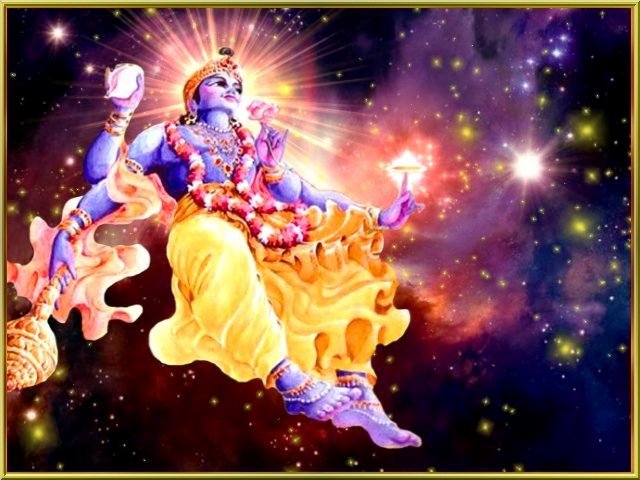
DISCLAIMER: The author is solely responsible for the views expressed in this article. The author carries the responsibility for citing and/or licensing of images utilized within the text.
